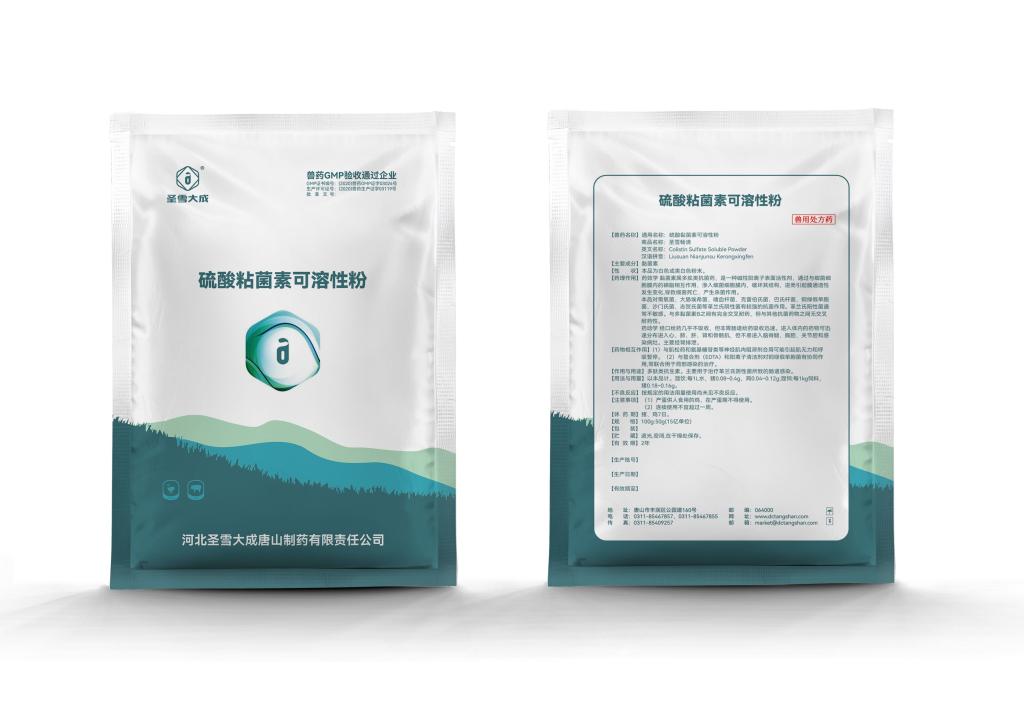Tel:+8618231198596

News
 CONTACT
CONTACT
 CONTACT
CONTACT
- Linkman:Linda Yao
- Tel: +8618231198596
- Email:linda.yao@dcpharma.cn
- Linkman:CHARLES.WANG
- Department:Overseas
- Tel: 0086 0311-85537378 0086 0311-85539701
News
Current Position:
Home >
News
>From Lab Bench to Barn: Practical Applications of Colistin Sulfate Soluble Powder.
From Lab Bench to Barn: Practical Applications of Colistin Sulfate Soluble Powder.
TIME:2024-01-15
Understanding Colistin Sulfate Soluble Powder:
Colistin sulfate, derived from the polymyxin class of antibiotics, has a well-established mechanism of action against Gram-negative bacteria. As a soluble powder, it offers a convenient form for administration in livestock. The translation of colistin sulfate from laboratory discovery to on-farm use showcases its potential in addressing bacterial infections that pose threats to animal health and farm productivity.
Managing Bacterial Infections in Livestock:
Bacterial infections can have significant consequences for livestock, affecting growth rates, reproductive performance, and overall herd or flock health. Colistin sulfate soluble powder provides a targeted solution for managing infections caused by Gram-negative bacteria, such as Escherichia coli and Salmonella, which are common pathogens in the agricultural setting.
Practical Applications in Livestock Farming:
a. Preventive Measures:
Colistin sulfate soluble powder is often used preventively in livestock farming to reduce the risk of bacterial infections. Incorporating it into feed or drinking water helps establish a barrier against potential pathogens, contributing to overall herd health.
b. Treatment Protocols:
In cases where bacterial infections are diagnosed, colistin sulfate can be used as part of treatment protocols. Veterinary oversight is crucial to ensure proper dosage, duration, and administration, considering factors such as the severity of the infection and the specific pathogen involved.
c. Large-Scale Administration:
The soluble powder form allows for easy and cost-effective large-scale administration in feedlots or intensive farming systems. This convenience is essential for efficiently managing the health of a large number of animals.
d. Water Medication:
Colistin sulfate can be administered through drinking water, offering flexibility in delivery methods. This method is particularly useful in situations where individualized treatments may be challenging.
Responsible Use Practices:
While colistin sulfate soluble powder is a valuable tool in livestock management, responsible use practices are imperative to mitigate the risk of antimicrobial resistance (AMR). Key elements of responsible use include:
a. Veterinary Oversight:
Ensuring that colistin sulfate is used under the guidance of a veterinarian who considers factors such as disease diagnosis, dosage precision, and withdrawal periods.
b. Monitoring and Surveillance:
Implementing monitoring and surveillance programs to track antibiotic use and resistance patterns, allowing for timely intervention and adjustments to treatment protocols.
c. Education and Training:
Providing education and training for farmers, farm workers, and veterinarians on responsible antibiotic use, emphasizing the importance of adherence to prescribed protocols.
d. Alternatives and Research:
Encouraging research into alternatives to antibiotics and supporting innovations that reduce reliance on colistin sulfate, contributing to sustainable farming practices.
Addressing Challenges:
The practical application of colistin sulfate soluble powder in agriculture is not without challenges. Addressing these challenges is essential for ensuring the continued efficacy of this antibiotic and sustaining the health of livestock:
a. Antibiotic Resistance Concerns:
The development of antibiotic resistance is a primary concern. Implementing measures to minimize the risk of resistance, such as targeted use and rotation with other antibiotics, is crucial.
b. Environmental Impact:
The release of antibiotics into the environment through animal waste raises environmental concerns. Research into the environmental fate of colistin and strategies to mitigate its impact is essential.
c. Public Perception:
Public perception of antibiotic use in agriculture can influence consumer choices. Transparency and communication about responsible antibiotic practices help build trust and understanding.
d. Regulatory Oversight:
Robust regulatory oversight is necessary to enforce guidelines on the sale and use of colistin sulfate, ensuring compliance with responsible use practices.
Future Directions:
The future applications of colistin sulfate soluble powder in agriculture are intertwined with the broader evolution of farming practices and antibiotic use. Considerations for the future include:
a. Precision Farming Technologies:
Integration of precision farming technologies for targeted administration, ensuring optimal use of antibiotics and minimizing environmental impact.
b. Alternative Therapies:
Continued research into alternative therapies, such as probiotics, phytogenics, and innovative disease control methods, to reduce reliance on antibiotics.
c. Global Collaboration:
Collaboration at the global level to share knowledge, research findings, and best practices, contributing to a unified approach to antibiotic use in agriculture.
d. Sustainable Farming Practices:
Emphasizing sustainable farming practices that balance the need for disease control with environmental and public health considerations.
Conclusion:
Colistin sulfate soluble powder has made a significant journey from the lab bench to the barn, becoming an integral part of practical applications in livestock farming. Its role in managing bacterial infections underscores its value in ensuring animal health and welfare. However, responsible use practices, regulatory oversight, and ongoing research are essential to address challenges and safeguard the efficacy of this antibiotic. As agriculture evolves towards more sustainable and resilient practices, the responsible use of colistin sulfate soluble powder remains a crucial component of modern livestock management. Balancing the benefits of antibiotic use with the imperative of sustainable and responsible practices is key to meeting the challenges of the evolving agricultural landscape.
- Tel:+8618231198596
- Whatsapp:18231198596
- Chat With Skype







